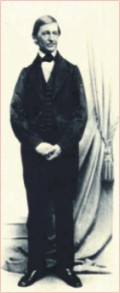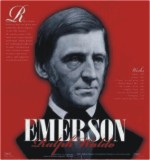Feature
"Ne te quæsiveris extra"
Mohammad Shahidul Islam
"Self-Reliance," first published in Essays (First Series) in 1841, is widely considered to be the definitive statement of Ralph Waldo Emerson's philosophy of individualism and the finest example of his prose. The essay is a fabric woven of many threads, from a journal entry written as early as 1832 to material first delivered in lectures between 1836 and 1839.
  Emerson was known for his repeated use of the phrase "trust thyself." "Self-Reliance" is his explanation both systematic and passionate of what he meant by this and of why he was moved to make it his catch- phrase. Every individual possesses a unique genius, Emerson argues, that can only be revealed when that individual has the courage to trust his or her own thoughts, attitudes, and inclinations against all public disapproval. Emerson was known for his repeated use of the phrase "trust thyself." "Self-Reliance" is his explanation both systematic and passionate of what he meant by this and of why he was moved to make it his catch- phrase. Every individual possesses a unique genius, Emerson argues, that can only be revealed when that individual has the courage to trust his or her own thoughts, attitudes, and inclinations against all public disapproval.
According to the conventions of his time, Emerson uses the terms "men" and "mankind" to address all humanity, and the multitude of examples he gives of individuals who exhibited self-reliance and became great are all men. These factors somewhat date Emerson's presentation; the underlying ideas, however, remain powerful and relevant.
Ralph Waldo Emerson, American essayist, poet, and philosopher, was born May 25, 1803, in Boston, Massachusetts. He was the son of William Emerson, a well-known minister, and Ruth Haskins, daughter of a merchant. In 1811, when Emerson was eight, his father died, leaving his mother to rear six children. His aunt, Mary Moody Emerson, was a writer who took an interest in the education of her four nephews. It is likely that she played a large role in Emerson's development as a writer.
Despite the family's poverty after his father's death, Emerson attended Boston Latin School, a private academy. In 1817, at age fourteen, he enrolled, on scholarship, at Harvard College, where he won several prizes for his writing. After graduation in 1821, Emerson worked as a teacher at a school run by his older brother William. In 1825, he enrolled in Harvard Divinity School, and a year later he began a career as a Unitarian minister. Soon, he became chaplain of the Massachusetts Senate.
"Ne te quæsiveris extra " is Latin for "do not look outside yourself." This is the first line of Emerson's essay "Self Reliance." It is a summation of the entire essay, the message that a person should look to him/herself for inspiration, judgment and validation of his or her own thoughts and ideas. Emerson points out that it is easier to live as one wishes while alone and as others wish while among them, but he says that the most difficult task is to live as one wishes while among others. Living the way, others think, one should waste the energy, one needs to accomplish one's own purpose.
 Emerson believes all men are equal in the sense that each person is subject to the same forces of life. He asserts that an unknown man who makes a good choice is as important as a famous man who also makes a good choice is. When a "private" man acts on his own, original views, he will stand out more than a mediocre king. Emerson urges all who believe in self-reliance and the universal mind to live their lives quietly at home, instead of going out and preaching their ideas to the world. Emerson believes all men are equal in the sense that each person is subject to the same forces of life. He asserts that an unknown man who makes a good choice is as important as a famous man who also makes a good choice is. When a "private" man acts on his own, original views, he will stand out more than a mediocre king. Emerson urges all who believe in self-reliance and the universal mind to live their lives quietly at home, instead of going out and preaching their ideas to the world.
"Self-Reliance" is widely considered Emerson's definitive statement of his philosophy of individualism. This philosophy esteems individuals above all societies, nations, religions, and other institutions and systems of thought. Emerson repeatedly calls on individuals to value their own thoughts, opinions, and experiences above those presented to them by other individuals, society, and religion. This radical individualism springs from Emerson's belief that each individual is not just unique but divinely unique; i.e., each individual is a unique expression of God's creativity and will. Further, since Emerson's God is purposeful, He molded each individual to serve a particular purpose, to do a certain work that only he or she is equipped to carry out. This direct link between divinity and the individual provides assurance that the individual will, when rightly exercised, can never produce evil.
Mohammad Shahidul Islam, Working in National Tourism Organization
|
